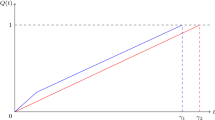Abstract
Applying the technique of smoothed perturbation analysis (SPA) to theGI/G/1/K queue, we derive gradient estimators for two performance measures: the mean steady-state system time of a served customer and the probability that an arriving customer is rejected. Unbiasedness of the estimators follows from results of a previous general framework on SPA estimators. However, in that framework, the estimators often require the simulation of numerous additional sample subpaths, possibly making the technique practically infeasible in applications. We exploit some of the special structure of theGI/G/1/K queue to come up with an estimator which requires at most the simulation of a single additional sample subpath. By establishing certain regenerative properties, we provide a strong consistency proof for the estimator.
Similar content being viewed by others
References
X.R. Cao, A sample performance function of closed Jackson queuing networks, Oper. Res. 36 (1988) 128–136.
C.G. Cassandras and S.G. Strickland, On-line sensitivity analysis of Markov chains, IEEE Trans. Automatic Control AC-34 (1989) 76–86.
M.C. Fu and J.Q. Hu, Smoothed perturbation analysis for general discrete-event systems, IEEE Trans. Automatic Control 37 (1992) 1483–1500.
P. Glasserman, Structural conditions for perturbation analysis derivative estimation: finite-time performance indices, Oper. Res. 39 (1991) 724–738.
P. Glasserman,Gradient Estimation Via Perturbation Analysis (Kluwer Academic, 1991).
P. Glasserman and W.B. Gong, Smoothed perturbation analysis for a class of discrete event systems, IEEE Trans. Automatic Control AC-35 (1990) 1218–1230.
P. Glasserman, J.Q. Hu and S.G. Strickland, Strong consistency of steady state derivative estimates, Prob. Eng. Inform. Sci. 5 (1991) 391–413.
W.B. Gong and P. Glasserman, Perturbation analysis of theM/G/1/K Queue, in:Proc. 27th IEEE Conf. on Decision and Control (1988) 1114–1118.
W.B. Gong and Y.C. Ho, Smoothed perturbation analysis of discrete-event dynamic systems, IEEE Trans. Automatic Control AC-32 (1987) 858–867.
Y.C. Ho and X.R. Cao,Discrete Event Dynamic Systems and Perturbation Analysis (Kluwer Academic, 1991).
Y.C. Ho and S. Li, Extensions of infinitesimal perturbation analysis, IEEE Trans. Automatic Control AC-33 (1988) 827–838.
R. Suri and M.A. Zazanis, Perturbation analysis gives strongly consistent sensitivity estimates for theM/G/1 queue, Management Sci. 34 (1988) 39–64.
M. West, M.C. Fu and J.Q. Hu, Simulation experience in applying perturbation analysis toGI/G/1/K queues, Working paper, College of Business and Management, University of Maryland at College Park (1993).
R.W. Wolff,Stochastic Modeling and the Theory of Queues (Prentice-Hall, 1989).
M.A. Zazanis, Weak convergence of sample path derivatives for the waiting time in a single-server queue, in:Proc. 25th Allerton Conference (1987) 297–304.
Author information
Authors and Affiliations
Rights and permissions
About this article
Cite this article
Fu, M.C., Hu, J.Q. Smoothed perturbation analysis for queues with finite buffers. Queueing Syst 14, 57–78 (1993). https://doi.org/10.1007/BF01153526
Received:
Revised:
Issue Date:
DOI: https://doi.org/10.1007/BF01153526



